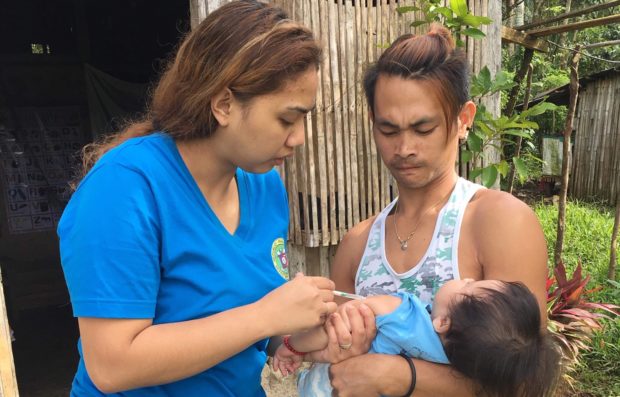Vaccine sites in churches, food chains eyed

MEASLES PROTECTION A health worker injects a child with a vaccine against measles in Kalayaan, Laguna. —PHOTO FROM DOH CALABARZON
SAN PEDRO CITY — The Department of Health (DOH) in Cavite, Laguna, Batangas, Rizal and Quezon (Calabarzon) is putting up measles vaccination stations in churches and fast food restaurants to help stop the spread of the disease, which has killed at least 50 people.
This is apart from the government health centers and efforts of health workers, who have been going house to house to offer free immunization since the disease broke out earlier this month.
Rising cases of measles
Regional health chief Eduardo Janairo on Sunday said the number of infected people continued to rise despite the government’s appeal to the public to get immunized.
Malacañang said that President Rodrigo Duterte himself would publicly appeal to parents to have their children vaccinated.
Article continues after this advertisement“I hear the President will help Health Secretary (Francisco) Duque III in bringing back the public’s trust in the Department of Health’s immunization program,” Presidential Communications Secretary Martin Andanar said over state-run Radyo Pilipinas.
Info campaign
Last week, the President directed the DOH to work with the Presidential Communications Operations Office, which Andanar heads, in executing an information campaign on vaccination.
Janairo said the DOH would put up health stations near fast food chains and church grounds as these were frequented by parents and their children.
“We (also) sent letters to all Sunday Mass celebrations and other Sunday religious activities to read (out) our advice on measles,” he added.
The DOH prioritizes children between 6 months old and 5 years old, although older children and adults who have yet to get the vaccine are also encouraged to do so.
The DOH blamed the outbreak, first declared in the National Capital Region, to the vaccine scare triggered by the Dengvaxia scandal.
Cases of measles in the NCR rose by 550 percent from Jan. 1 to Feb. 6.
It has since spread to Calabarzon, Central Luzon, Central Visayas and Western Visayas.
972 cases in Calabarzon
As of Sunday noon, the DOH-Calabarzon has recorded 972 cases, with 25 deaths. The age of those infected ranges from 13 days old to 59 years old.
“It could even reach a thousand,” Janairo said in a phone interview, as reports from health centers are still coming in.
According to the DOH data, the number of cases was particularly high in Rizal province with 465 recorded cases and 18 deaths, with 15 from Antipolo City; followed by Laguna with 167 cases and four deaths; Cavite with 126 cases and three deaths; Batangas with 167 cases and Quezon province with 72 cases.
The Philippine Health Insurance Corp. assured the public that confinements due to measles are compensable. —With reports Julie M. Aurelio and Tina G. Santos














